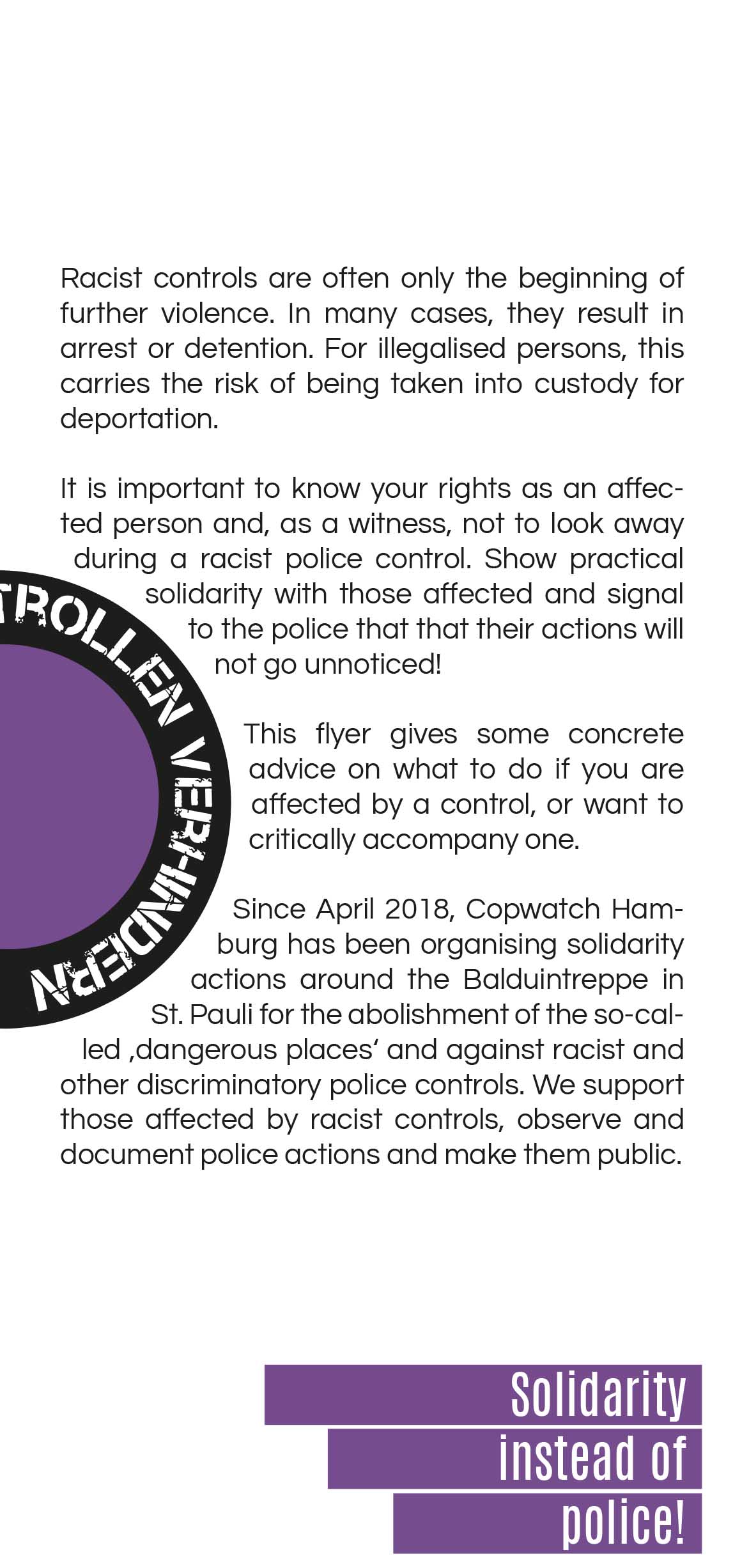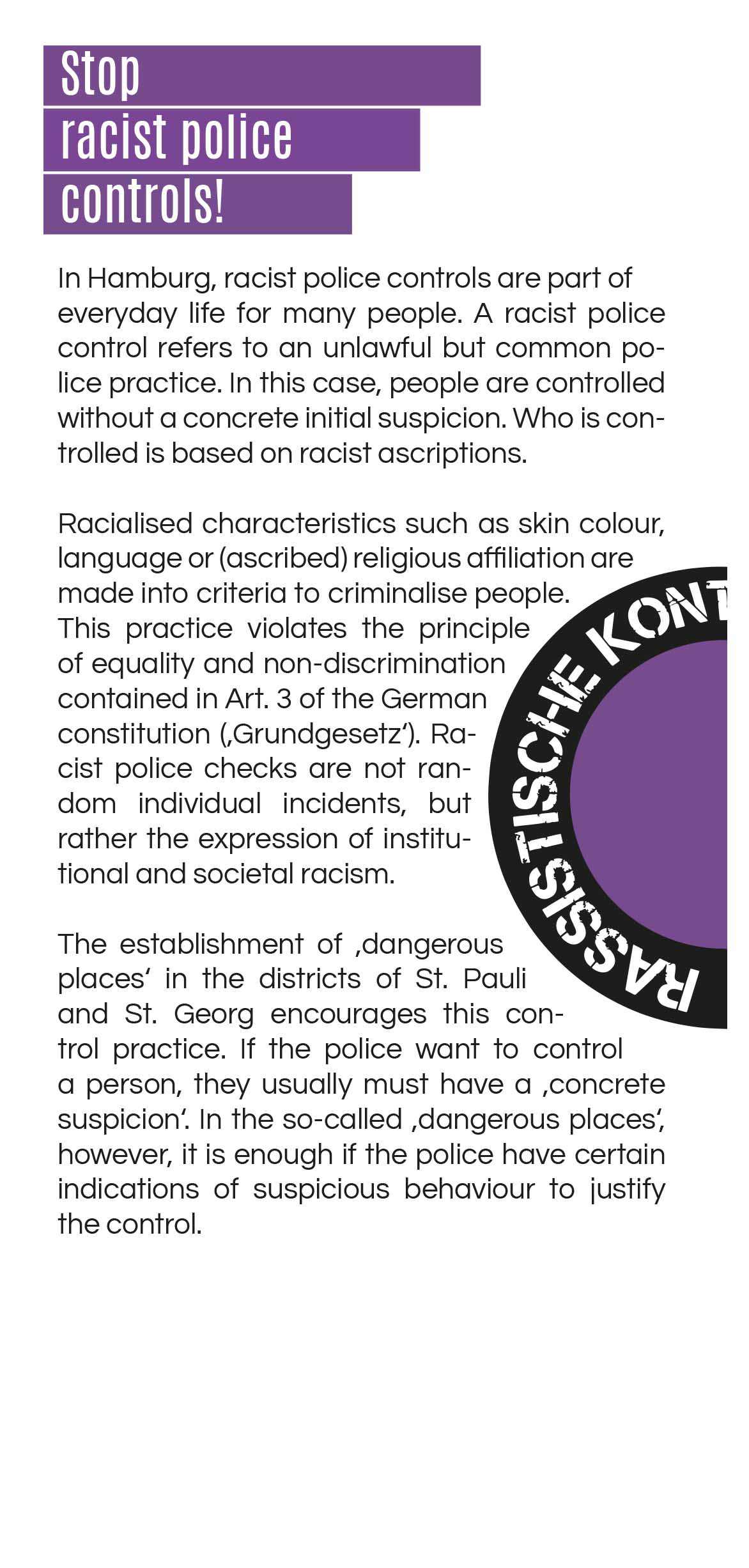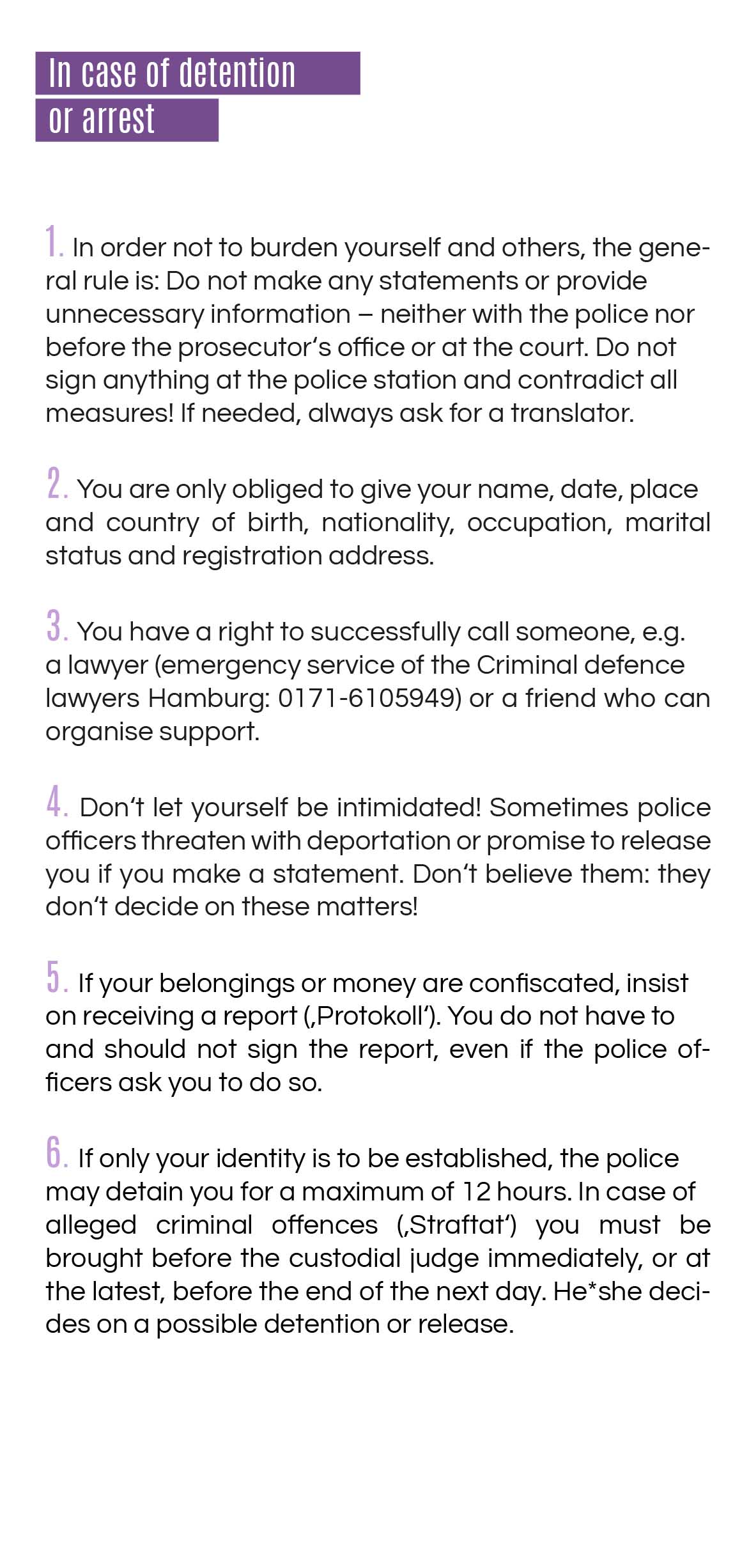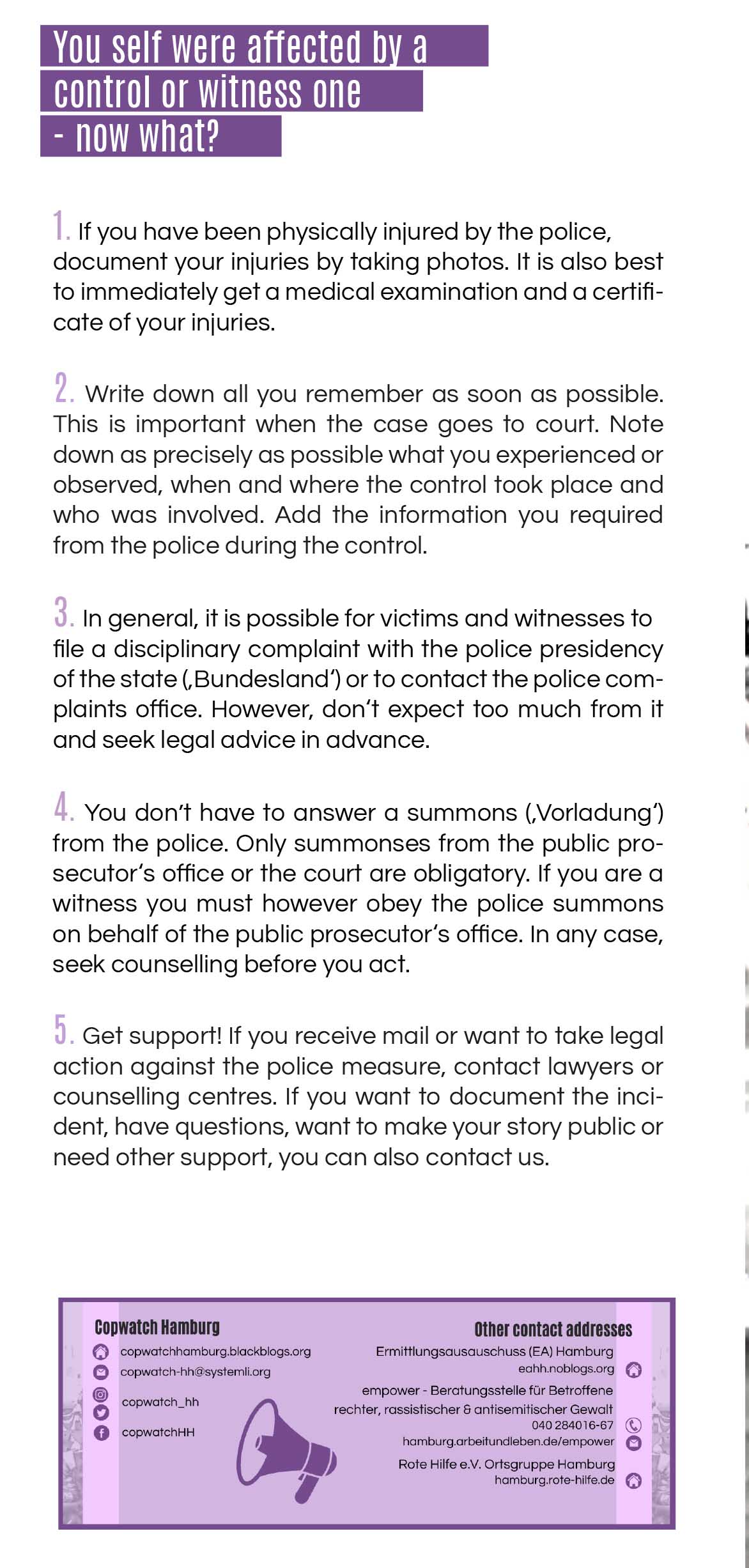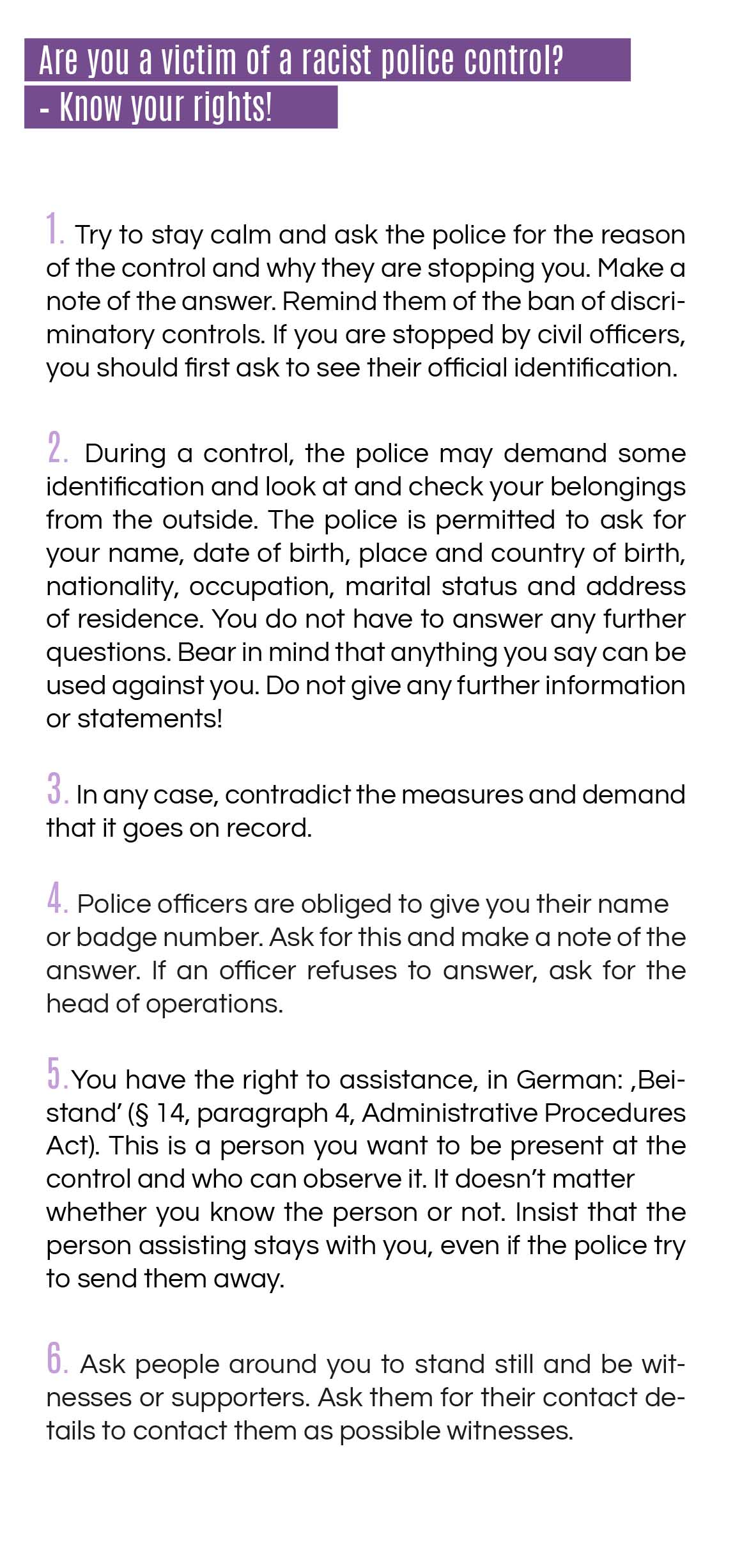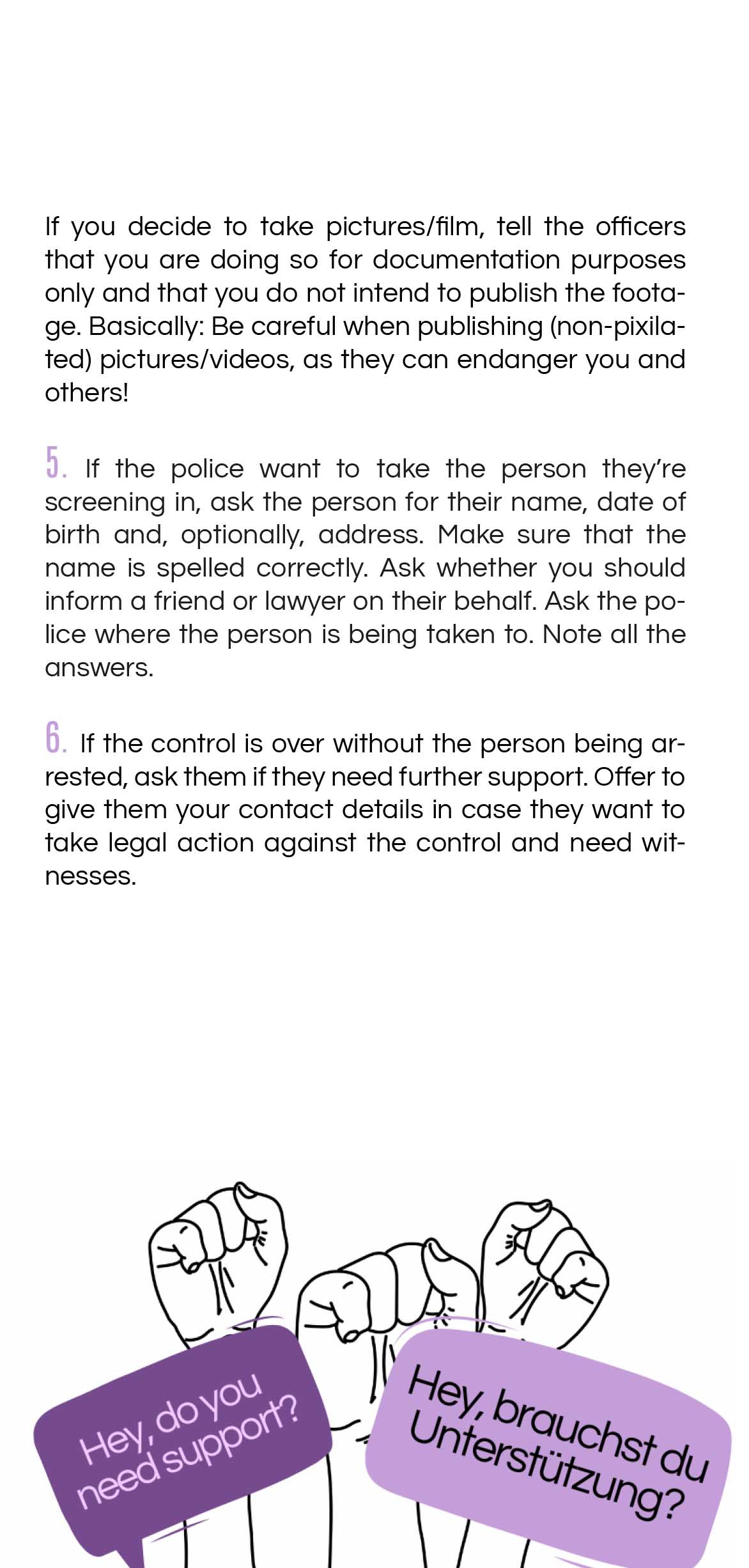Advice for action and information for victims and witnesses of racist police controls
Racist controls are often only the beginning of further violence. In many cases, they result in arrest or detention. For illegalised persons, this carries the risk of being taken into custody for deportation.
It is important to know your rights as an affected person and, as a witness, not to look away during a racist police control. Show practical solidarity with those affected and signal to the police that that their actions will not go unnoticed!
Are you a victim of a racist police control?– Know your rights!
- Try to stay calm and ask the police for the reason of the control and why they are stopping you. Make a note of the answer. Remind them of the ban of discriminatory controls. If you are stopped by civil officers, you should first ask to see their official identification.
- During a control, the police may demand some identification and look at and check your belongings from the outside. The police is permitted to ask for your name, date of birth, place and country of birth, nationality, occupation, marital status and address of residence. You do not have to answer any further questions. Bear in mind that anything you say can be used against you. Do not give any further information or statements!
- In any case, contradict the measures and demand that it goes on record.
- Police officers are obliged to give you their name or badge number. Ask for this and make a note of the answer. If an officer refuses to answer, ask for the head of operations.
- You have the right to assistance, in German: ‚Beistand’ (§ 14, paragraph 4, Administrative Procedures Act). This is a person you want to be present at the control and who can observe it. It doesn’t matter whether you know the person or not. Insist that the person assisting stays with you, even if the police try to send them away.
- Ask people around you to stand still and be witnesses or supporters. Ask them for their contact details to contact them as possible witnesses.
In case of detention or arrest
- In order not to burden yourself and others, the general rule is: Do not make any statements or provide unnecessary information – neither with the police nor before the prosecutor‘s office or at the court. Do not sign anything at the police station and contradict all measures! If needed, always ask for a translator.
- You are only obliged to give your name, date, place and country of birth, nationality, occupation, marital status and registration address.
- You have a right to successfully call someone, e.g. a lawyer (emergency service of the Criminal defence lawyers Hamburg: 0171-6105949) or a friend who can organise support.
- Don‘t let yourself be intimidated! Sometimes police officers threaten with deportation or promise to release you if you make a statement. Don‘t believe them: they don‘t decide on these matters!
- If your belongings or money are confiscated, insist on receiving a report (‚Protokoll‘). You do not have to and should not sign the report, even if the police officers ask you to do so.
- If only your identity is to be established, the police may detain you for a maximum of 12 hours. In case of alleged criminal offences (‚Straftat‘) you must be brought before the custodial judge immediately, or at the latest, before the end of the next day. He*she decides on a possible detention or release.
You observe a racist police control– what can you do?!
- First approach the control with some distance and speak to the person in question whether they need your support. Offer yourself as assistance (‚Beistand‘ § 14, paragraph 4, Administrative Procedure Act). Make it clear that you stand in solidarity with the person concerned and that you want to act on their behalf. A control situation is unpleasant, take the wishes of the affected person seriously. If they refuse your support, move on.
- Police officers often react aggressively when their actions are accompanied by criticism. This can affect you, but also the person being controlled. Therefore, do not let yourself be provoked and try to react in a de-escalating and calm manner. The police may accuse you of disturbing the control and send you away with prohibition to return to the site (‚Platzverweis‘). If the police officer asks you to leave, move away only so far that you can continue to observe the control. If the person concerned has accepted you as assistance (‚Beistand‘), the police is not allowed to simply send you away.
- Talk to the police officers and ask them why they are carrying ot the control. Make a note of the answer. Remindthem of the prohibition of discriminatory controls. Also, ask for the names or badge numbers of the officers and make a note of them. Police officers are legally obliged to provide this information, if they do not do so, ask for the head of operations. Important: If the control is carried out by civil police, ask to see their official identification.
- You can document the control situation by taking photos (no close-ups or individual shots!) or filming. Be careful, as the police may use this as an opportunity to confiscate your mobile phone, record your data or report you to the police. If you decide to take pictures/film, tell the officers that you are doing so for documentation purposes only and that you do not intend to publish the footage. Basically: Be careful when publishing (non-pixilated) pictures/videos, as they can endanger you and others!
- If the police want to take the person they’re screening in, ask the person for their name, date of birth and, optionally, address. Make sure that the name is spelled correctly. Ask whether you should inform a friend or lawyer on their behalf. Ask the police where the person is being taken to. Note all the answers.
- If the control is over without the person being arrested, ask them if they need further support. Offer to give them your contact details in case they want to take legal action against the control and need witnesses.
You self were affected by a control or witness one – now what?
- If you have been physically injured by the police, document your injuries by taking photos. It is also best to immediately get a medical examination and a certificate of your injuries.
- Write down all you remember as soon as possible. This is important when the case goes to court. Note down as precisely as possible what you experienced or observed, when and where the control took place and who was involved. Add the information you required from the police during the control.
- In general, it is possible for victims and witnesses to file a disciplinary complaint with the police presidency of the state (‚Bundesland‘) or to contact the police complaints office. However, don‘t expect too much from it and seek legal advice in advance.
- You don’t have to answer a summons (‚Vorladung‘) from the police. Only summonses from the public prosecutor‘s office or the court are obligatory. If you are a witness you must however obey the police summons on behalf of the public prosecutor‘s office. In any case, seek counselling before you act.
- Get support! If you receive mail or want to take legal action against the police measure, contact lawyers or counselling centres. If you want to document the incident, have questions, want to make your story public or need other support, you can also contact us.
Other contact addresses:
Ermittlungsausschuss (EA) Hamburg: www.eahh.noblogs.org
Rote Hilfe e.V. Ortsgruppe Hamburg: www.hamburg.rote-hilfe.de
Empower – counseling center for those affected by right-wing, racist and antisemitic violence: www.hamburg.arbeitundleben.de/empower

